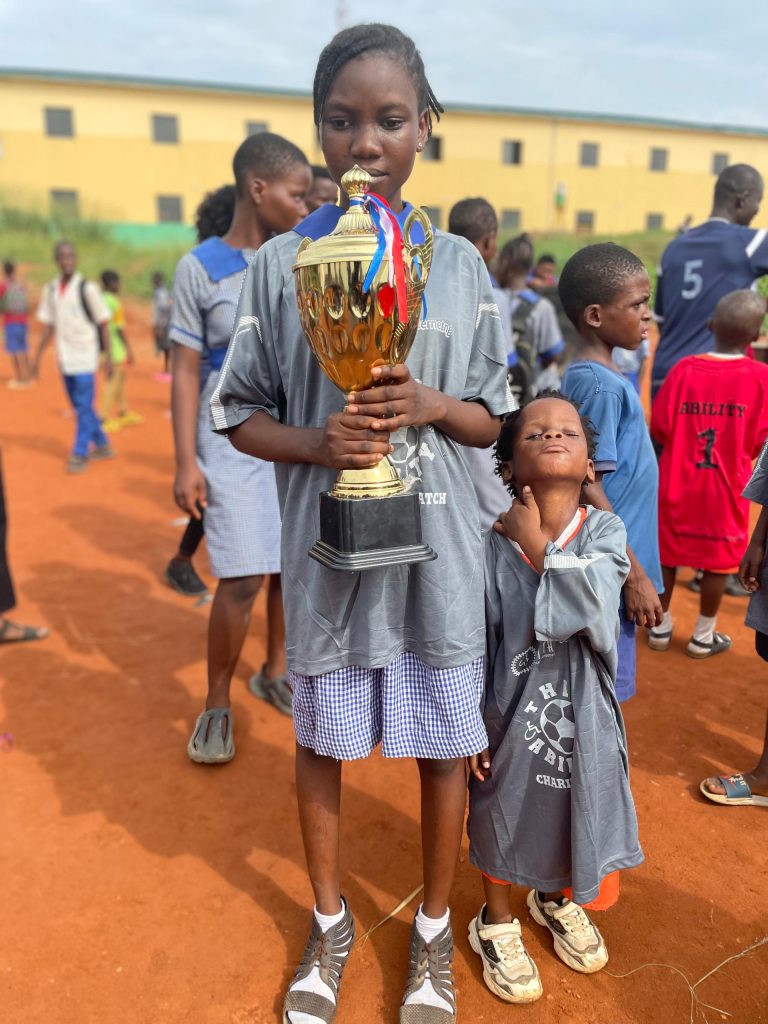It is no longer news that football, the beautiful game we all watch, wields the power to cut across hearts, cultures, traditions and history, giving people hope and memories that will be etched into their souls for a lifetime, and folktales to tell for the future generations.
On Christmas day in 1914, German and English soldiers came to a truce in No Man’s Land, and played a game of football, leading to the eventual call-off of the First World War, with football acting as the cushion for unity in diversity.
While a lot of people can pick up a ball and just have fun, there’s another world where some cannot, or even if they want to, their bodies won’t let them.
Raising Stars African Foundation, in conjunction with Soccernet Nigeria organized a charity football competition for children with disabilities in Lagos, Nigeria.
Some of them are Autistic, visually impaired, physically disabled, mentally impaired and most have hearing impairment. The competition was Themed “This-Ability”, in a bid to show the ability of children with special needs and to promote inclusive education.
A lot of these children are known to be fans of football, but due to conditions that are no fault of theirs, have never had the chance to enjoy the thrill of emotions that come with kicking a ball and seeing your team win.
The event was hosted in two schools, with the Initial one at All Saints Inclusive schools in Agege Lagos. The second competition was held at Oki Inclusive Unit, Iyana Ipaja where there are classes meted out for the mentally challenged, and the hearing impaired for individuals ranging from the age of 2 to over 50.
All Saints Inclusive Schools
A small school with a little football pitch just at the centre, but the community of students present made all of them included. Some of their teachers have disabilities as well, but that’s not a problem as regards communication, because sign language is primarily used to spread and receive information, even on the football pitch.
Four games were played, with each set being a pair of two teams – The Inclusion team, and The Ability team. Both teams had a male side and a female side, which were further split into another two, as the deaf took on the deaf, and the mentally impaired did the same. Medals were awarded to students with stand-out performances as there were no losers.
The sheer joy on the faces of their teachers and the players themselves was palpable. They communicated without words and appointed set-piece takers just by the movement of their hands. The referee did not need to use a whistle since they were deaf, and even more surprisingly, the children danced to music they couldn’t hear.
The game was not short of action either. Tackles rained and flair was on display. Even better, crackers were scored, as one of the Goalkeepers scored directly from a goal-kick.
I met one of the former students of the school, Ahmed. Ahmed was previously unable to talk but now speaks in a way the average person can understand. Although he’s moved on from school, he comes back from time to time to help the teachers and talk with his friends, without speech.
At the end of the games, the school heads were thankful for the unconventional out-of-classroom event, pleading for more of these events in the future and asking for a better working environment to meet the special needs of the kids.
Oki Inclusive Unit
Here, the children put up a show as they kick-started with cheerleading, popularly called callisthenics. They grooved and danced to the music. I discussed with their dance instructor, Miss Sowunmi Kofoworola, who is known for helping with dancing exercises for children with disabilities and asked how she was able to get the students to get into the rhythm since most of them were unable to listen to the music.
“I just get them to do what I do. It was tough at first because they couldn’t hear me, and I couldn’t understand them, but their teacher came in and used sign language and that has helped me understand them better. I’ve been doing this for three years, but the language is the biggest barrier,” the dance instructor explained to Soccernet.ng.
Like the game at All Saints in Agege, four matches were played, but this time, on a much bigger field, and with a penalty shoot-out involved. One of the goalkeepers made two saves to deny the opponents from twelve yards, and they were awarded gold and silver medals based on their performances.

On the sidelines, the teachers were very supportive, and helped the other students who weren’t on the pitch to show support in the way they could, raising their hands in what indicated they were clapping for their friends who were putting in the work on the football pitch.
Challenges
In a discussion with the Pioneer of the event for the foundation, Mr Michael Showunmi, he opened up on the struggles of putting things like this together.
“Due to the communication barrier, it’s hard to get them prepared for events like this. It is also a lot of work, to go from the government to the schools to get licences and permission to help the children, but now they’re happy, in this moment, and that’s what matters,” the event pioneer said.
In a world of so many different challenges and experiences faced by humans, the game of football has time and again proven to be a point of unity and community. It’s only natural to use the means to bridge our differences so as to help us understand ourselves better.
